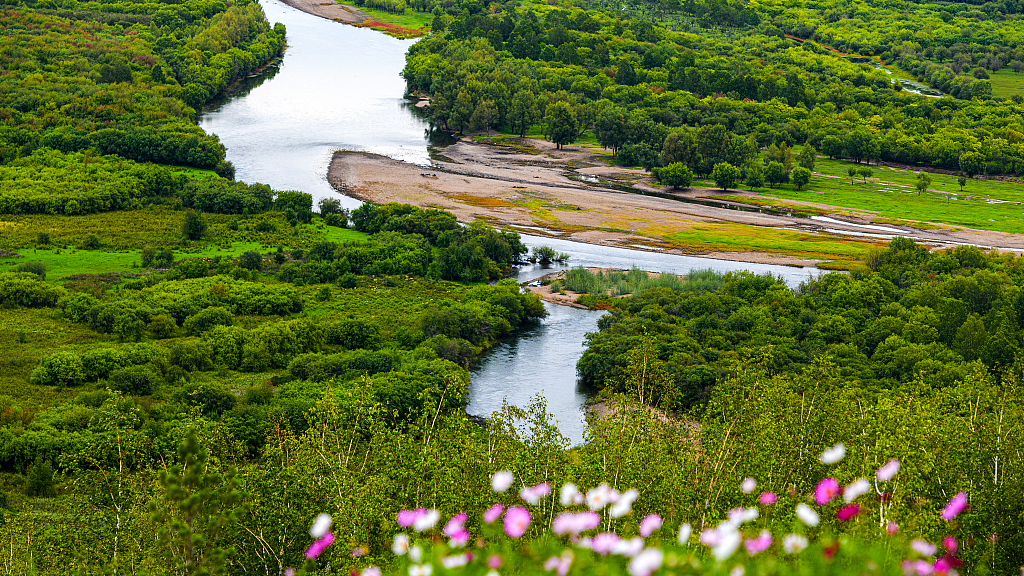
Waterways cut through Ergun National Wetland Park in Inner Mongolia Autonomous Region amid lush forests and foliage. /CFP
Waterways cut through Ergun National Wetland Park in Inner Mongolia Autonomous Region amid lush forests and foliage. /CFP
Editor's note: Bereket Sisay, a special commentator on current affairs for CGTN, is a commentator on international affairs, with a special focus on Africa. The article reflects the author's opinions and not necessarily the views of CGTN.
General Secretary of the Communist Party of China Central Committee Xi Jinping, also Chinese president and chairman of the Central Military Commission, made an inspection tour of Bayannur City in North China's Inner Mongolia Autonomous Region on Monday and Tuesday. After the tour, President Xi said that after more than 40 years of unrelenting efforts, China has made remarkable achievements in preventing and controlling desertification and achieved a historic transformation from "sand forcing humans to retreat" to "trees forcing sand to retreat." The economic and social developments as well as the ecological outlook of desertification areas have undergone earth-shattering changes, Xi said, adding that the dangers of sandstorms and soil erosion have been effectively curbed.
Desertification is a severe threat to human life and sustainable development. Lands and soils that have been degraded lose their ability to support animal and plant life. They are unable to offer water, food, or shelter from the ravages of drought, floods, and other natural calamities. This weakens nations' efforts to attain progress and a high standard of living. It also puts the next generation at risk while exacerbating the challenges faced by those who bear the brunt of the inescapable problem of climate change. To reverse this negative trajectory, China has made unremitting efforts to curb desertification and restore land through green initiatives.
As a result, more than half of China's arable desertified land has been restored in the past decade. According to the National Forestry and Grassland Administration, China's desertified land area has been reduced by more than 4.33 million hectares since 2012. In addition, 64 million hectares of trees have been planted in China over the past decade. The country's forest cover has reached 23.04 percent, an increase of 2.68 percentage points since 2012. Furthermore, the area of desertified land in the country has shrunk by an average of 242,400 hectares per year. This is a reversal from the late 1990s when desertified land expanded by 1.04 million hectares annually.
This is a great success and has made China a leading actor in the global effort to protect desert ecology. China's holistic approach to preventing desertification by promoting forests, grasslands, wetlands, rivers, and lakes to improve the local ecology could be an important reference for developing countries, especially Africa, which has long struggled with such problems despite its positive spillover effects for the world.

A general view taken on December 3, 2022, shows the sunrise on the Chiriet dunes, north-east of Iferouane at the beginning of the Tenere portion of the Sahara desert. /CFP
A general view taken on December 3, 2022, shows the sunrise on the Chiriet dunes, north-east of Iferouane at the beginning of the Tenere portion of the Sahara desert. /CFP
According to the Food and Agriculture Organization report in 2020, Africa continued to lose the forest in the last decade, with a net annual forest loss of 3.94 million hectare during the 2010–2020 period. As much as 65 percent of productive land in Africa is degraded, while desertification affects 45 percent of Africa's land area. Estimates suggest that although 625 million hectare are regenerating and 11.39 million hectare have been planted in the last decade, this is insufficient to address the scale of the problem. Over the past decade, just about one quarter of all countries in Africa have experienced an overall increase in forest cover through afforestation or natural expansion.
As a result, this vast desertification continues to lower agricultural output and revenue while also contributing to biodiversity loss in many African dry zones. This more likely negatively impacted the food security of the continent as well as the overall development of the continent, as a significant portion of the population and its economy depend on agriculture. The United Nations estimated that by 2030, Africa will lose two-thirds of its arable land if the pace of desertification – the spread of arid, desert-like areas of land – is not stopped. This is likely to increase the current World Bank estimate of 140 million people facing acute food insecurity on the continent.
Africa should therefore strengthen its partnership with China in the fight against climate change and desertification. Africa should make greater use of China's experience in restoring large areas of land and its ecological reserves in a very short time. In addition, China's technical assistance to Africa in the form of knowledge transfer should be strengthened, as the continent needs a highly skilled workforce to address these difficulties through local innovative solutions.
In particular, China should step up its exchange and cooperation efforts through its International Knowledge Management Center for Desertification Prevention and Control. This exchange partnership will accelerate the process of finding long-term, time-efficient, and cost-efficient solutions to the continent's ever-growing and dynamic problems. The two sides should also make full use of the China-Africa Green Cooperation Mechanism, which has emerged as a result of both the Belt and Road Initiative and the Forum on China-Africa Cooperation. This includes infrastructure and development finance assistance, which is essential for Africa to successfully address its desertification challenges and other compounding difficulties. The Chinese commitment to pursue its efforts to combat desertification and further cement its partnership with Africa will potentially contribute to global efforts becoming more sustainable and successful.
(If you want to contribute and have specific expertise, please contact us at opinions@cgtn.com. Follow @thouse_opinions on Twitter to discover the latest commentaries in the CGTN Opinion Section.)